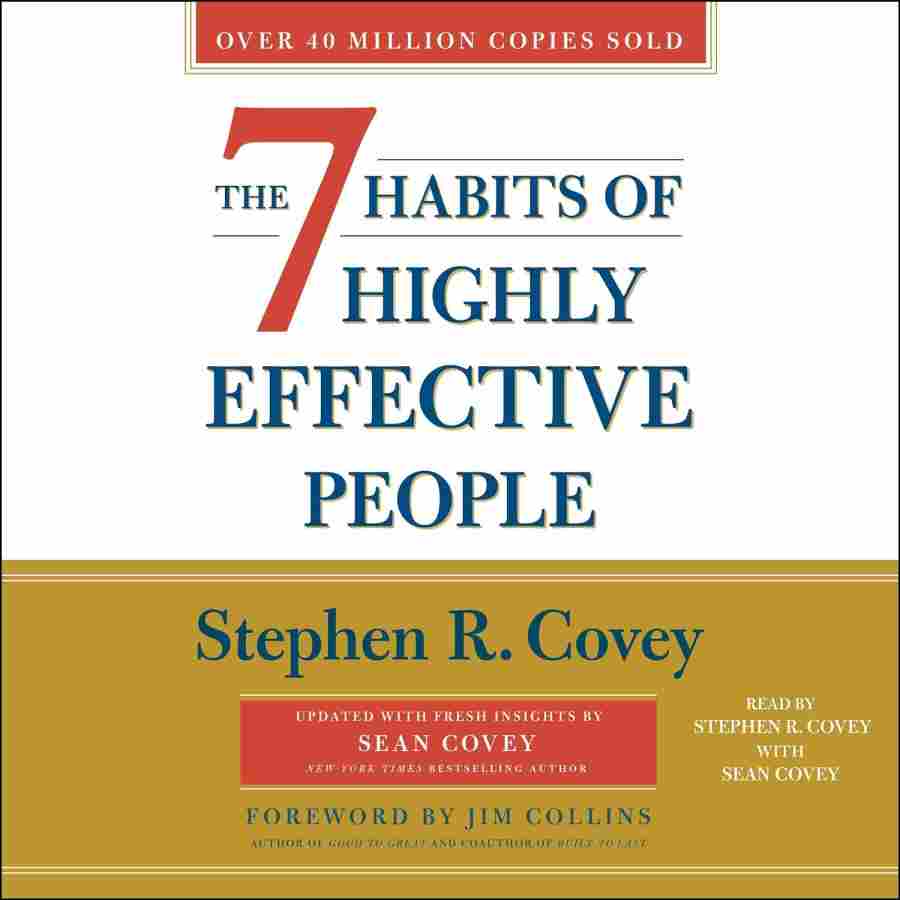
It’s a regular Sunday afternoon, and I’m browsing the newest audiobooks on Amazon. Given my preference for self-help books, “The 7 Habits of Highly Effective People” by Sean Covey and Jim Collins piqued my interest right away. As someone who has already published countless reviews of self-help and personal development books, I approached this one with a combination of curiosity and cautious hope. After all, many self-help books make lofty promises but fall short of delivering on them. However, this book shone out, reminding me of Stephen Covey’s original work, another masterpiece in this category.
In order to have a better understanding of the book, I read Amazon’s descriptions, reader reviews, and numerous online summaries. The book is well-known for its practical recommendations on how to improve one’s personal and professional performance. As I went further, I couldn’t help but notice Sean Covey and Jim Collins’ clear and systematic approach to modernizing and expanding on Stephen Covey’s basic concepts.
The Premise: A Refresher Course on Effectiveness
“The 7 Habits of Highly Effective People” is based on the premise that living effectively requires aligning one’s activities with timeless and universal principles. The book advocates for a paradigm change in thinking and behavior that leads to long-term success, rather than merely short-term remedies. This idea is what connects it to other transformational works such as James Clear’s “Atomic Habits”. Both works highlight the importance of incremental, persistent adjustments throughout time.
Chapter Summaries.
Habit 1: Be proactive
The book begins with a discussion of the value of proactivity. Being proactive is accepting responsibility for your own life and activities, rather than blaming circumstances or others. Covey and Collins underline that proactive people understand their freedom to choose how they respond to every given event. This habit emphasizes taking control and not being a victim of external circumstances.
Habit 2: Start with the end in mind
This chapter emphasizes the necessity of creating specific objectives and imagining the intended results before beginning any work. By setting a clear end objective, you construct a road map for success. Covey and Collins propose that personal and professional missions should influence everyday activities, ensuring that behaviors are consistent with long-term goals. This habit is strongly associated with the ideas of vision and purpose.
Habit 3: Prioritize first things first
This habit revolves on time management. Covey and Collins present a time management matrix to help readers prioritize activities based on their urgency and value. This habit promotes focused on activities that contribute to long-term objectives rather than being bogged down by urgent but unimportant duties. It requires discipline and the capacity to say no to less essential tasks.
Habit 4: Think win-win
This chapter dives into the idea of mutual benefit. Covey and Collins claim that effective interactions and relationships are based on the win-win principle, which ensures that both parties feel valued and appreciated. This habit entails cultivating an abundant attitude, or the notion that there is enough for everyone and that one person’s success does not imply another’s failure.
Habit 5: Seek first to understand, then to be understood
Communication is essential for good relationships, and this habit emphasizes the need of empathic listening. Covey and Collins emphasize that knowing people should come before being understood. Genuinely listening to people fosters trust and leads to more successful communication and cooperation.
Habit 6: Synergize
Synergy is the concept that the whole is greater than the sum of its parts. This habit emphasizes creative collaboration and teamwork. Covey and Collins emphasize that when individuals collaborate well, they may achieve significantly greater outcomes than they might separately. This entails respecting differences, using strengths, and correcting for flaws.
Habit 7: Sharpen the saw
The fourth habit focuses on self-renewal and constant progress. Covey and Collins encourage frequent self-care in four areas: physical, mental, emotional, and spiritual. Taking time to replenish and recharge gives you the energy and ability to practice the other six habits successfully.
Why It Resonates
Reading “The 7 Habits of Highly Effective People” reminded me of other books with similar influence. For example, Charles Duhigg’s “The Power of Habit” explores how habits impact our lives and how we may use them to our benefit. Both texts emphasize the value of focused practice and ongoing self-improvement.
However, what distinguishes Covey and Collins is their comprehensive approach. They do not address productivity or personal achievement in isolation, but rather combine these factors into a comprehensive framework that fosters total well-being. This complete viewpoint is why their work has remained relevant and effective throughout time.
Final thoughts
In a society overflowing with fast solutions and shallow counsel, “The 7 Habits of Highly Effective People” shines out as a beacon of pragmatic knowledge. Covey and Collins provide timeless concepts that, when rigorously applied, may result in significant personal and professional change. Their focus on character ethics above personality ethics is a welcome reminder that genuine efficacy comes from inside.
Whether you’re a seasoned reader of self-help books or new to the genre, this book offers essential insights to help you negotiate the intricacies of contemporary life. It serves as a reminder that being successful requires doing the right things rather than doing more of them. Finally, doing the right things leads to a more satisfying and impactful life.


